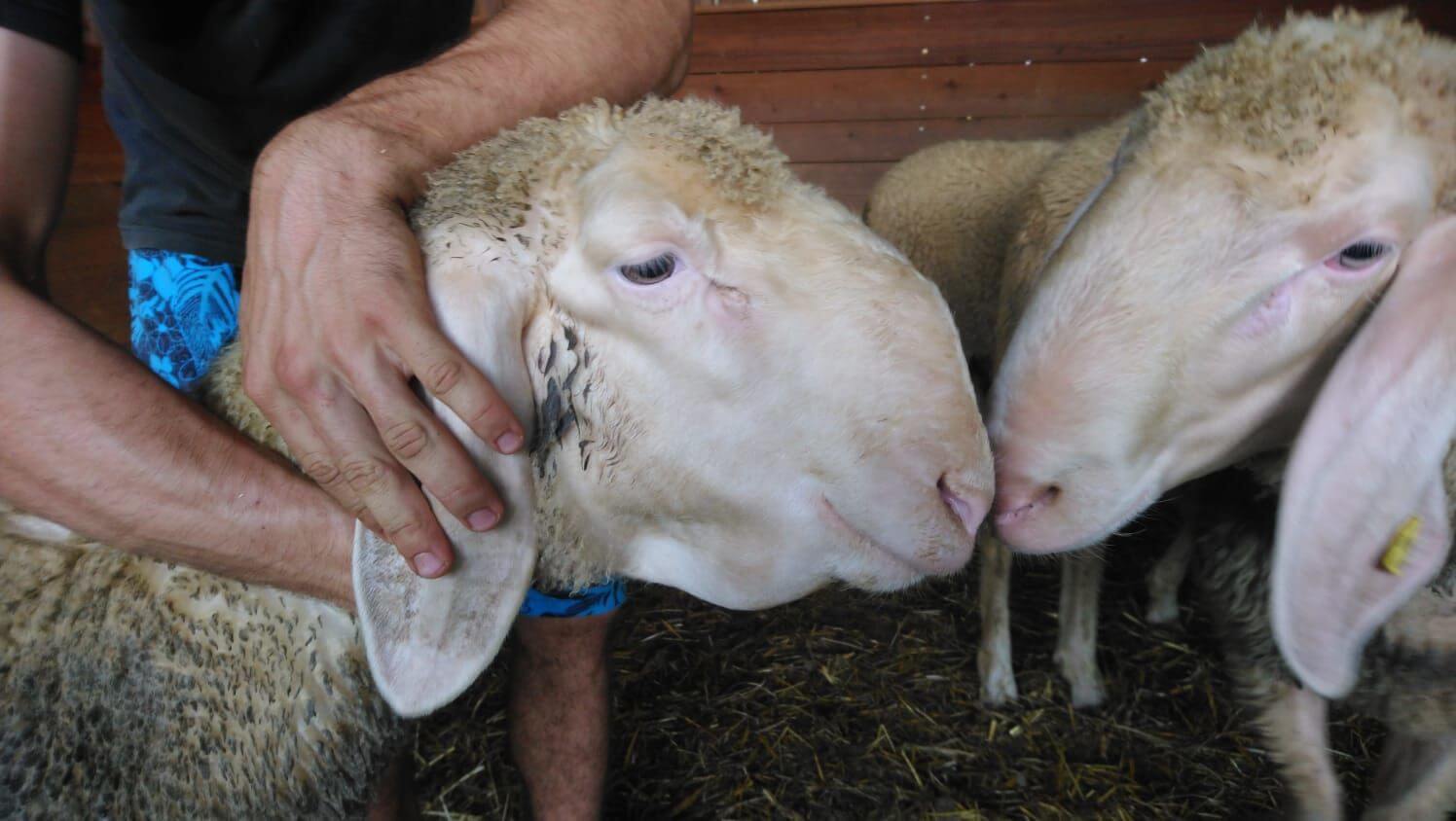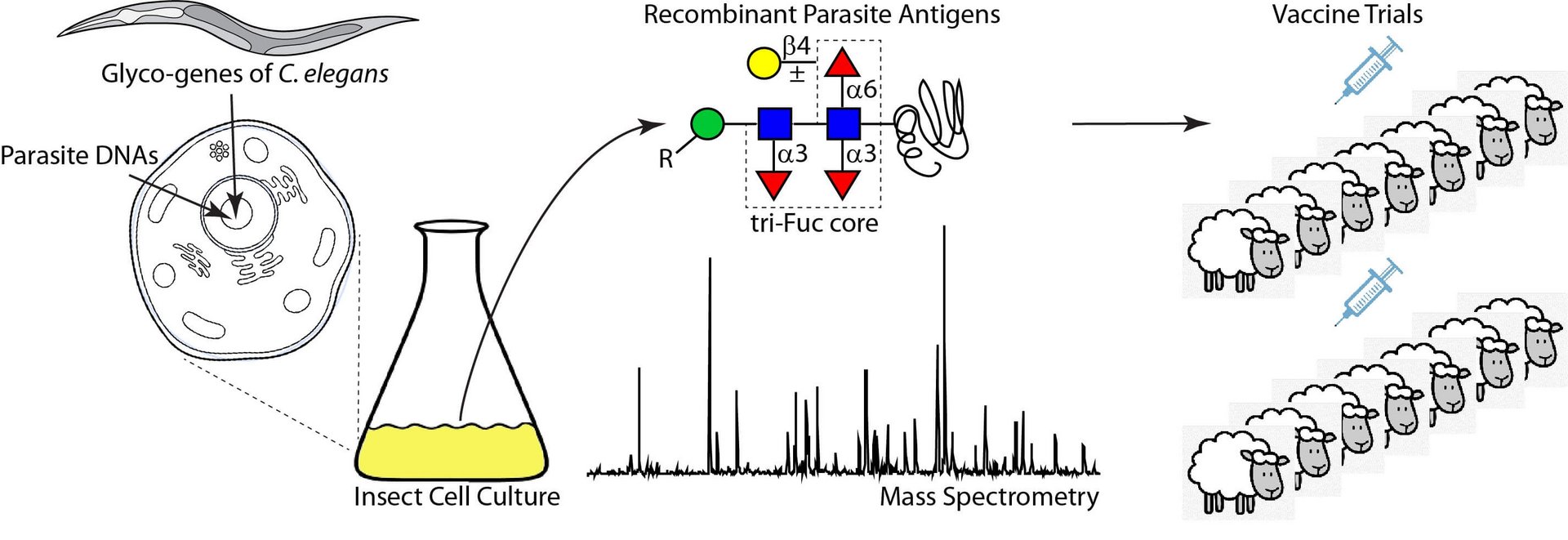- top-vet-science /
- haemonchusvaccine
Haemonchus contortus, the barber’s pole worm, is an important parasite of small ruminants worldwide. This nematode inhabits the abomasum and causes blood loss and ill thrift and in cases if high worm burden also death. Frequent treatment with anthelmintic drugs (“deworming”) must be applied for sufficient parasite control; however, resistance against all classes of anthelmintic drugs has been described in H. contortus, so new measures for parasite control must be developed to enable farming of sheep and goats in industrialized as well as non-industrialized areas worldwide. Currently, a vaccine based on native (subunit) glycoproteins of H. contortus is available in limited amounts which is produced directly from worms derived from infected sheep. In order to produce larger amounts of vaccine cost-effectively, the current project aims to develop recombinant glycoproteins by glycoengineering. The targeted protein is part of the parasite’s digestive tract and is known to be immunogenic in sheep and goats.
The project is a collaboration between the University Clinic for Ruminants (Dr. med. vet. Katharina Lichtmannsperger) and the Institute of Parasitology (Dr. nat.techn. Shi Yan) of the Vetmeduni and is funded through the Top Vet Science program.
Team
Katharina Lichtmannsperger graduated from the University of Veterinary Medicine, Vienna in 2017. After she received her diploma degree with a specialization on large and small ruminants, she worked on her doctoral thesis on protozoal infection, especially Giardia and Cryptosporidium, in calves in Austria from 2017 to 2020. Her doctoral thesis was awarded in 2020. Since September 2021, she is a Diplomate of the European College of Bovine Health Management (ECBHM). In 2021, she became the project leader of the Top Vet Sciene project funded by the University of Veterinary Medicine Vienna.
Shi Yan studied at the Soochow University between 2001 and 2008 in China and received his BSc in Biotechnology and MSc in Biochemistry and Molecular Biology. He was a Marie Curie early stage fellow within the EuroGlycoArrays consortium and obtained his PhD on N-glycosylation of C. elegans at the University of Natural Resources and Life Sciences Vienna in 2012. After four years as a postdoctoral researcher, working on further aspects of nematode N-glycomics, he became a principal investigator at the University of Veterinary Medicine Vienna in 2017. He is a project leader of a Stand-Alone project supported by the Austrian Science Fund (FWF) and the joint Top-Vet-Science project funded by the University of Veterinary Medicine Vienna (2021-2025).
Since 2003, Anja Joachim is Professor for Parasitology and Head of the Institute of Parasitology at the University of Veterinary Medicine, Vienna. Prof. Joachim’s research activities mainly focus on control strategies of companion and livestock animals parasites and on parasitic infection models in vivo and in vitro. Since 2009 she is member of the Editorial Board of Parasitology Research. Since 2016 she is member of the Educational Committee of the European Veterinary Parasitology College (of which has been president from 2009 to 2012) and Section Editor of Frontiers in Veterinary Science. To date, Anja Joachim has published over 200 peer-reviewed papers and 3 book chapters.
Thomas Wittek is a Professor for Ruminant Medicine and Surgery, working as clinician, teacher, head of the ruminant clinic and clinical researcher in Vienna for over 10 years. He has worked in Germany, the USA and Scotland. His main research interests are internal, infectious and metabolic diseases in ruminants and New World camelids. He has published over 150 papers in peer-reviewed scientific journals, made several contributions to books, and has given numerous oral and poster presentations at scientific meetings
Isabella Adduci studied at the University of Bari (Italy) and graduated in March 2018, gaining a bachelor degree in Biological Science. She continued her academic studies at the University of Trieste (Italy) and graduated in May 2021 with a Master of Science in Functional Genomics degree. From September 2019 to January 2020 she joined the Erasmus Exchange Programme and studied at the University of Vienna. From March to December 2020, she conducted her master study and contributed to a FWF funded project at the University of Veterinary Medicine Vienna.
Since October 2021, she is a PhD student at the Institute of Parasitology working on the Top Vet Science project funded by the University of Veterinary Medicine, Vienna.
Licha N. Wortha studied Biomedical Engineering, specializing in Cell and Tissue Engineering, at the University of Applied Sciences Technikum Wien. Towards the end of her studies, she was able to gain some hands-on-experience during a half-year internship at the University of Veterinary Medicine Vienna (Institute of Medical Biochemistry). She earned a Bachelor of Science in Engineering in 2019. Licha N. Wortha is currently a technician at the Institute of Parasitology at the University of Veterinary Medicine Vienna.
Barbara Hinney studied veterinary medicine in Leipzig and graduated in 2006. She wrote her doctoral thesis on the epidemiology of horse helminths at the Institute of Parasitology and Tropical Medicine, FU Berlin, where she was also employed as research assistant. Since 2009 Barbara Hinney is researcher at the Institute of Parasitology at the Vetmeduni Vienna. Since 2011 she is leading the working group “parasitological diagnostics” at this institute. After her residency under the supervision of Prof. Joachim she was appointed as diplomate of the European Veterinary Parasitology College (EVPC) in 2016. Her current research focus is the diagnosis, monitoring and control of helminth infections and anthelmintic resistance in ruminants. She is a MC member at the COST-Action COMBAR (combatting anthelminthic resistance in ruminants): COMBAR
Sandra Wiedermann studied Biology, specializing on Zoology at the University of Vienna and earned in 2018 a Master of Science. Her thesis concentrated upon the parasite-host interaction of an avian brood parasite. She is currently working on her second Master degree in Genetics and Developmental Biology from the University of Vienna. S. Wiedermann is a technician at the Institute of Parasitology at the University of Veterinary Medicine Vienna were she mainly works with parasites from ruminants and attends to classic diagnostics as well as molecular techniques.
Floriana Sajovitz started her diploma studies in veterinary medicine at the Vetmeduni Vienna in 2015. She received her diploma degree in 2021 with a specialization in Ruminant Medicine and Conservation Medicine. Her diploma thesis “Characteristics and evaluation of miRNA in rumen papillae for analysis of a local response to feed additives in a SARA animal model” was supervised by the Institute of Animal Nutrition and Functional Plant Compounds.
Since October 2021, she is working at the University Clinic for Ruminants as a PhD student in the Top Vet Science project funded by the University of Veterinary Medicine, Vienna.
Iain B. H. Wilson is associate professor at the Universität für Bodenkultur Wien since 2002; his expertise in molecular glycobiology and glycomics has been recognised by various awards. Despite various duties, including Reporter of the Austrian Science Fund (FWF) and President of the International Glycoconjugate Organization (2011–13), he still sometimes enthusiastically performs experiments on glycan mass spectrometry.
Min Hu studied Medicine at Hubei Medical University (now School of Medicine of Wuhan University) from 1982 to 1990, and worked at Hubei Institute of Schistosomiasis Control in China from 1990-1999. She went to Australia and joint Prof. Robin Gasser group at The University of Melbourne in 1999. After obtaining her PhD in 2003, she continued working as a Postdoc for 5 years. In 2010, Min Hu returned to China and became a Professor at Huazhong Agricultural University, College of Veterinary Medicine. Her research interests are: Molecular mechanisms regulating the development and reproduction of parasitic nematodes related with the host invasion and parasite-host interaction, drug resistance and vaccine development of Haemonchus contortus.
Prof. Hu will share her expertise on molecular parasitology and provide us native Haemonchus antigens and anti-sera.
After gaining a BSc.VetMed. (Veterinary University Hannover), Dirk Werling conducted his Dr. Med. Vet. thesis at the ETH Zuerich, where he examined the impact of Bovine Leukaemia Virus infection on the ability of bovine macrophages to respond to LPS. Dirk was supported by the German Research Foundation (DFG) and European Research Council during his postdoctoral period, and expanded the scope of his work to encompass the development of the innate immune system in ruminants, and aspect of pathogen escape mechanisms in innate immune cells. In 2003, Dirk Werling accepted a Senior Lectureship at the Royal Veterinary College, and was promoted to a personal tenured Chair and Professor in Molecular Immunology in 2007, and is currently Director of the Centre for Vaccinology and Regenerative Medicine at the RVC. His main research interest is the ontogeny of the innate immune system between species, the importance of SNP in innate immune receptors for ligand binding, and how one can use the knowledge regarding the innate immune system to design new/optimise existing vaccine strategies.
Currently, his research team is concentrating more on carbohydrate recognition and carbohydrate-based vaccines.
Project Advisory Board
- Otto Doblhoff‐Dier, Vice‐Rector of Research
- Anja Joachim, Mentor of the non‐clinical researcher of the project management
- Thomas Wittek, Mentor of the clinical researcher of the project management
- Fiona Tomley, Scientific Advisory Board Vetmeduni
- Sabine Ecker, Office for Research and Innovation
News from the Team
2023
Sajovitz, Floriana, Isabella Adduci, Shi Yan, Sandra Wiedermann, Alexander Tichy, Anja Joachim, Thomas Wittek, Barbara Hinney, and Katharina Lichtmannsperger. 2023. "Correlation of Faecal Egg Counts with Clinical Parameters and Agreement between Different Raters Assessing FAMACHA©, BCS and Dag Score in Austrian Dairy Sheep" Animals 13, no. 20: 3206. https://doi.org/10.3390/ani13203206
2022
Adduci, Isabella, Floriana Sajovitz, Barbara Hinney, Katharina Lichtmannsperger, Anja Joachim, Thomas Wittek, and Shi Yan. 2022. "Haemonchosis in Sheep and Goats, Control Strategies and Development of Vaccines against Haemonchus contortus" Animals 12, no. 18: 2339. https://doi.org/10.3390/ani12182339























